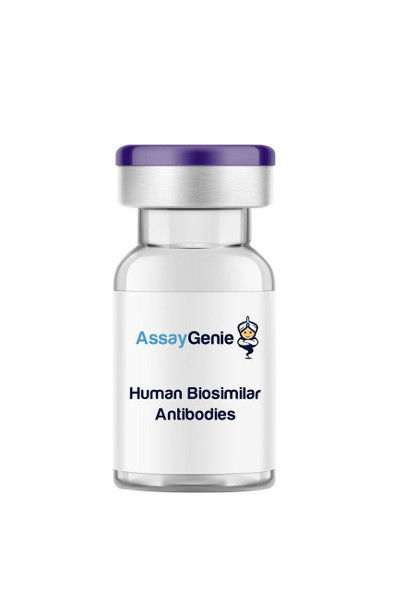Description
| Product Name: | Anti-RSV F protein (Palivizumab) |
| SKU: | IVMB0546 |
| Size: | 1.0 mg, 5.0 mg, 25 mg, 50 mg, 100 mg |
| Antibody Type: | Biosimilar Recombinant Human Monoclonal Antibody |
| Clone: | MEDI493 |
| Target: | Respiratory Syncytial Virus |
| Isotype: | Human IgG1κ |
| Host Species: | Human |
| Reactivity: | Human |
| Applications: | ELISA |
| Expression Host: | HEK-293 Cells |
| FC Effector Activity: | Active |
| Synonyms: | Human Respiratory Syncytial Virus (hRSV), Respiratory Syncytial Virus (RSV) |
| Product Concentration: | ≥ 5.0 mg/ml |
| Purity: | ≥95% by SDS Page |
| Immunogen: | Human RSV strain A2 |
| Endotoxin Level: | < 1.0 EU/mg as determined by the LAL method |
| Antigen Distribution: | F protein is found in RSV virion membranes in either an inactive prefusion conformation or an active postfusion conformation. |
| Formulation: | This biosimilar antibody is aseptically packaged and formulated in 0.01 M phosphate buffered saline (150 mM NaCl) PBS pH 7.2 - 7.4 with no carrier protein, potassium, calcium or preservatives added. Due to inherent biochemical properties of antibodies, certain products may be prone to precipitation over time. Precipitation may be removed by aseptic centrifugation and/or filtration. |
| Specificity: | Palivizumab binds to an epitope present in Site II, on the linear region of the F1subunit, of both the prefusion and postfusion forms of RSV F protein. |
| Additional Applications Reported In Literature: | ELISA FA |
Respiratory syncytial virus (RSV) is a major cause of acute lower respiratory tract infection and hospitalization in infants1. RSV F protein is a type I integral membrane protein essential for viral membrane fusion that is highly conserved among isolates of RSV A and B subgroups2. F protein has been investigated as a target for neutralizing antibodies, small molecular antiviral drug development, as a vaccine antigen, and as an antibody target for passive prophylaxis.
F protein is synthesized as an inactive, palmitoylated precursor (F0) and is decorated with N-linked glycans2. Three F0 monomers form a trimer and become activated by a furin-like host protease as they pass through the Golgi. The protease cleaves twice, generating three polypeptides: F2 and F1, which are covalently linked, and pep27, an intervening peptide that dissociates after cleavage. When functional F protein trimer in the virion membrane is triggered, it undergoes a major conformational change from a prefusion to a postfusion form.
Palivizumab is a humanized monoclonal antibody developed for the prevention of serious RSV in high risk infants3 and is the first monoclonal antibody introduced into clinical practice for the prevention of an infectious disease4. Palivizumab was generated by immunizing BALB/c mouse with human RSV strain A2 and fusing the lymphocytes with murine myeloma cell line NS0 to produce a hybridoma4, 5. The murine monoclonal antibody Mab 1129 was then humanized by grafting the antigen binding site to gene segments coding for an intact human IgG1 molecule. The resulting antibody sequence is 95% human, with a small number of murine residues retained to ensure the structural integrity of the binding site. Palivizumab effectively neutralizes over 500 clinical isolates of RSV subtypes A and B3. Its binding epitope is present in both prefusion and postfusion forms of RSV F6 and binding to the postfusion F ectodomain has been experimentally confirmed7, 8.
| Ligand/Receptor: | site A of the RSV-F glycoprotein |
| State of Matter: | Liquid |
| Regulatory Status: | Research Use Only (RUO). Non-Therapeutic. |
| Product Preparation: | Recombinant biosimilar antibodies are manufactured in an animal free facility using onlyin vitroprotein free cell culture techniques and are purified by a multi-step process including the use of protein A or G to assure extremely low levels of endotoxins, leachable protein A or aggregates. |
| Storage and Handling: | Functional grade biosimilar antibodies may be stored sterile as received at 2-8°C for up to one month. For longer term storage, aseptically aliquot in working volumes without diluting and store at -80°C. Avoid Repeated Freeze Thaw Cycles. |
| UniProt: | O36634 |
| Research Area: | Biosimilars |






